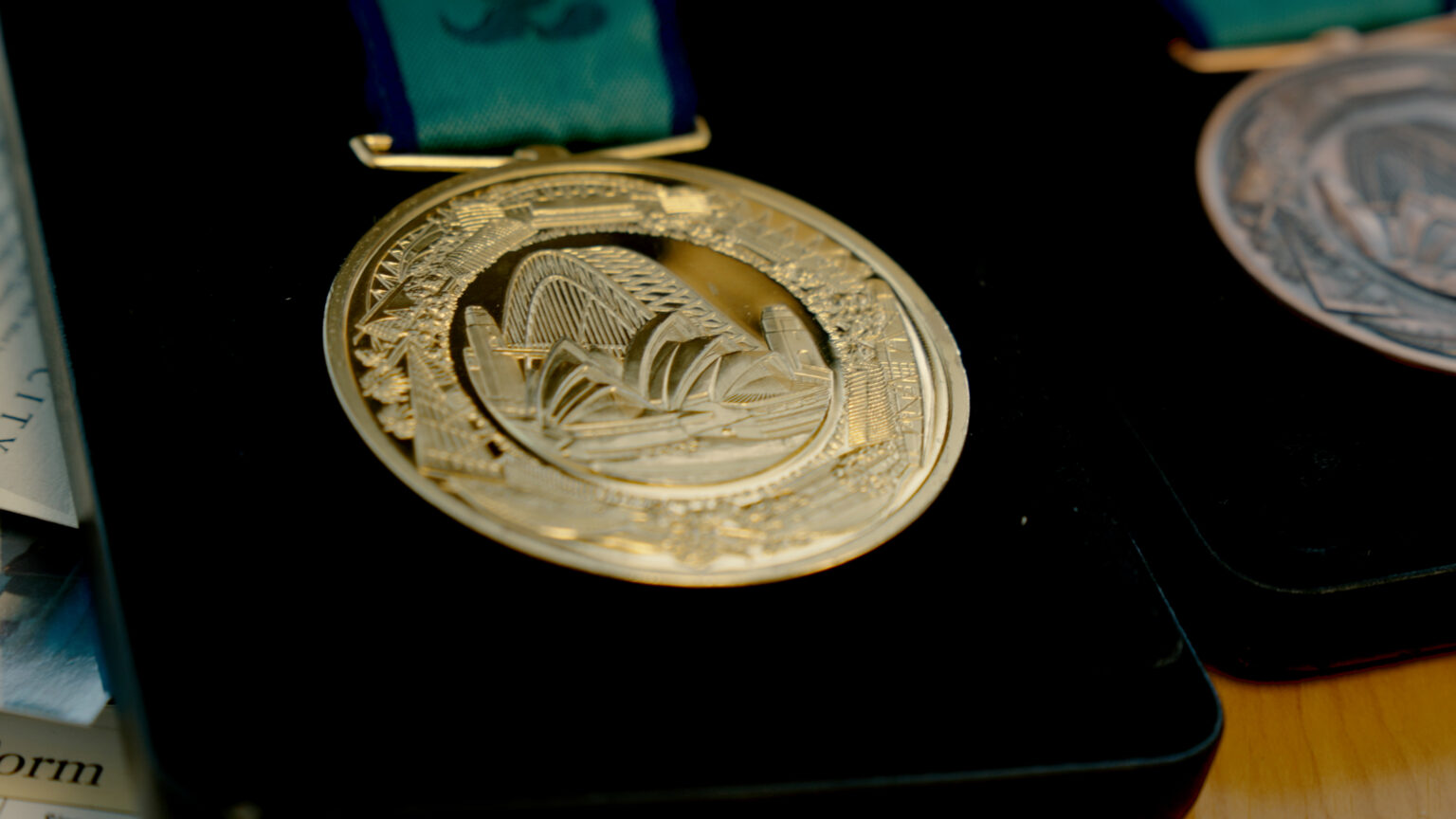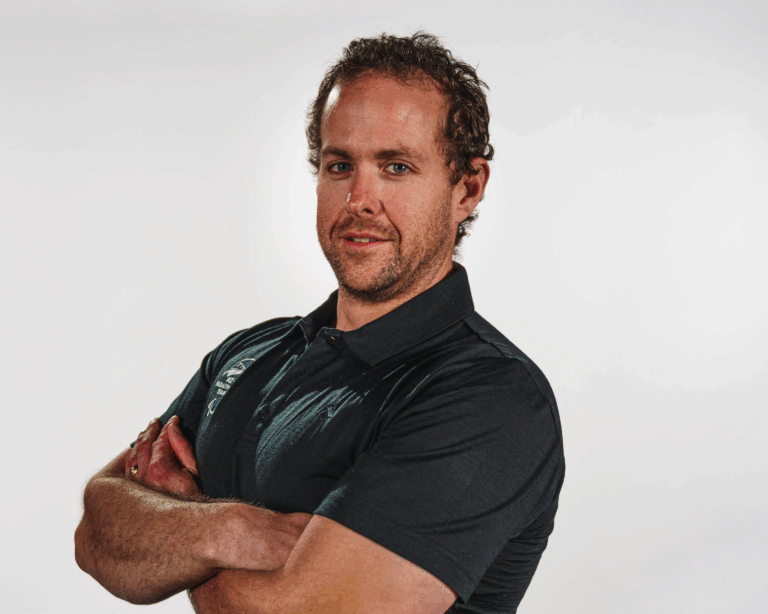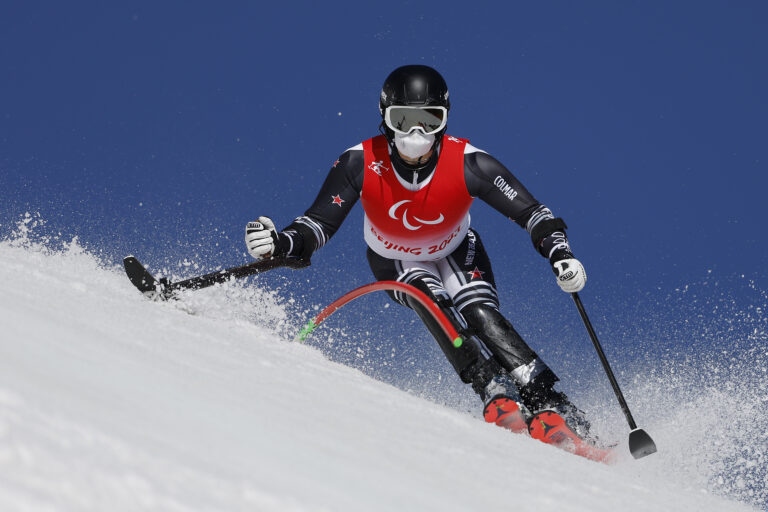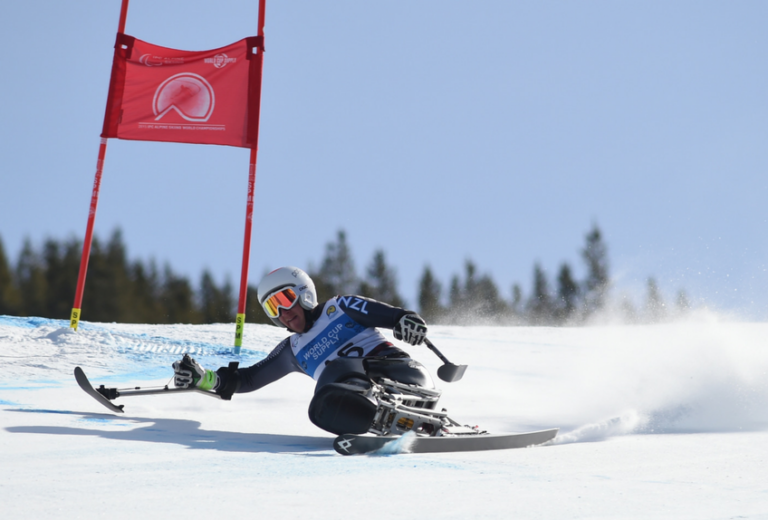Sydney 2000 provided a myriad of outstanding memories as a record-breaking sized NZ Paralympic Team snared 18 medals including six golds. On the 25th anniversary of the Opening Ceremony we reflect on the success of the Games for both the NZ Paralympic Team and the wider Paralympic Movement.
Sydney 2000 is fondly remembered as the Paralympic Games which changed the entire trajectory of the Paralympic Movement.
Widely regarded as a landmark Games, Sydney 2000 is often credited as the first time the public truly viewed Paralympians as equals to their Olympic counterparts. Exemplary organisation coupled with huge and passionate crowds helped elevate the Paralympic Games, ushering in a new era for the Paralympic Movement.
For the 42-strong NZ Paralympic Team (NZPT) – competing across 11 Para sports – it was also to prove a big success. With highlights packages screened on TVNZ for the first time, Kiwis could tune into regular coverage of the Paralympic Games while a swag of 18 medals won across five Para sports ensured the NZPT could look back on the event with pride and a kaleidoscope of great memories.
For Paralympian #117 Dean Booth, who claimed a Para swimming gold medal in the Men’s 400m Freestyle S7, the Games were “outstanding” in every aspect.
“We love to hate the Australians, but they treated us well and if an Aussie wasn’t competing in an event, they’d be cheering for us,” says Dean. “The whole experience was amazing. For the first time we didn’t feel like the Paralympic Games were secondary to the Olympic Games. We felt like we were as big as the Olympics.”
The team captain and flagbearer of the NZ Paralympic Team in Sydney 2000, Paralympian #99 Ben Lucas believes many factors contributed to the Games success but says the fact that for the first time all core services for the Paralympic Games would be delivered by the same staff and same team as for the Olympic Games was pivotal.
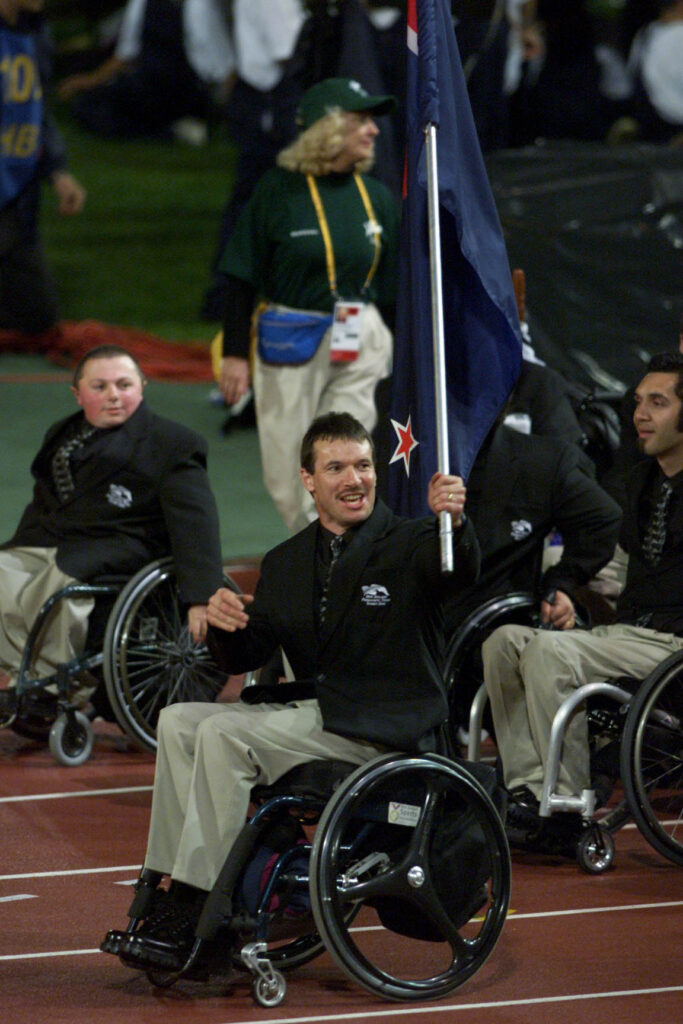
Paralympians would not only stay in the same Village as the Olympians, they would enjoy the same catering services, medical care and facilities, while ticketing, technology and transport systems for the Olympics were seamlessly extended to the Paralympics.
“The Atlanta Paralympic Games had been a disaster from an attendance perspective and for the first time the Olympic and Paralympic Games local organising committees worked together and this really showed,” says Ben, who was paralysed in a motorbike accident at the age of 24. “I remember racing in the stadium in the morning heats being full of school kids yelling and screaming, then in the afternoon sessions both tiers of the main stadium was full, although the screaming may have been an octave lower.”
New Zealand went into the Games with a blend of 18 returning Paralympians and 24 debutants and for Chef de Mission Dave Currie it was his role to create an environment which would best allow the Team to perform.
Dave had first tasted the Paralympic Games in Seoul 1988 as guide runner to visually impaired marathon runner Paralympian #67 Tui Rupe, who passed away in September. This piqued his interest in the Paralympic Movement, and later serving as Board Chair at Paralympics New Zealand and Executive Director at the Halberg Trust, he was appointed Chef de Mission for Sydney 2000.
“The role of the Chef is best understanding the environment the Para athletes are going to face during Games time,” he explains. “I worked hard to understand where the Team would be located in the Athletes’ Village, how the transport would work and other logistical matters. Athletes don’t like surprises, but as long as they know their needs are being listened to and they are being supported, they are happy.”
Adopting an athlete-centric approach he was prepared to go “into battle” for the Para athletes to ensure their interests were being heard. His next role was then to engender a culture which would best allow the Para athletes to thrive.
“The deal was once you finished performing you had to support your team-mates,” he explains. “We had a vibrant Team Lounge, we made sure we celebrated any successes as a Team – we did many simple things to create a sense of family.”
For Lucas, who was also NZ Paralympic Team captain for a second successive Paralympic Games, he had learned much from his first experience at Atlanta 1996. The wheelchair racer from Christchurch expressed the importance of what it means to compete for the NZ Paralympic Team but he was also keen to make sure the Team in Sydney 2000 expressed their culture.
“In Atlanta many of the national teams performed a team dance or a team song as we made our way to the stadium for the Opening Ceremony, but we weren’t prepared for anything in Atlanta (1996), it was embarrassing,” he explains. “But I spoke to Paralympian #100 Peter Martin MNZM and Paralympian #111 Sholto Taylor who taught the whole Team the haka. As we made our way to the stadium for the Opening Ceremony at Sydney, the Aussies were giving us some stick when we did the most bone chilling haka you could ever see to the Australians. After we finished everything went silent. Even the Aussies said that it was a fair cop. It was an amazing feeling. We repeated this as we were entering the stadium which fired us all up for the 110,000 people in the stadium. We were told later that we got the second biggest cheer after the Australians!”
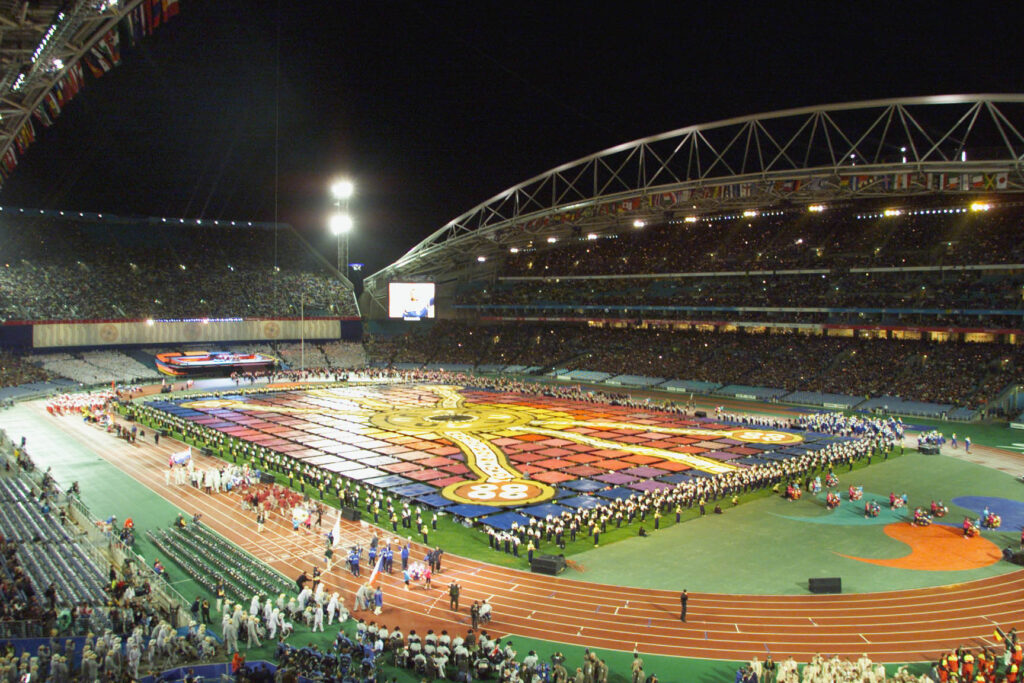
Paralympian #90 Jayne Craike MNZM, who was competing at her second Paralympic Games in the sport of Para equestrian, was blown away by her experience inside the cavernous Stadium Australia at the Opening Ceremony.
“It was phenomenal, the noise of the stadium was amazing,” she says, the pride of walking out there and seeing the athletes from the other teams was something truly special.”
Competing at what was effectively a “home Games” for New Zealand, the medals started to quickly rack up across the 11 days of competition. Paralympian #124 Mark Inglis ONZM was a popular winner of the silver medal in the velodrome in the Mixed 1km Time Trial LC3 having lost both legs due to severe frostbite after being stranded in an ice cave while attempting to climb Mt Cook some 18 years earlier.
Inglis, who would later create history as the first double amputee to climb Mt Everest, was ranked much lower than his eventual finishing position and Lucas, who at that time was working for ParaFed Canterbury, was immensely proud of his performance.
“I remember Mark had approached me two to three years out from Sydney 2000 saying ‘I want to win a medal’. I said, ‘if you are serious, you will have to start tomorrow.’ He did everything he could to achieve that goal and for him to win that medal was really special.”
Paralympian #80 Dave MacCalman MNZM went into his third Paralympic Games full of optimism after setting three world records in the Men’s Shot Put F52, Men’s Javelin F52 and Men’s Pentathlon P53 at the Swiss Championships just two months prior to Sydney 2000.
MacCalman, who was a rising basketball star before sustaining serious spinal injuries after diving headfirst into a river, had won Men’s Javelin F51 silver at Atlanta 1996, but felt poised for better in Sydney.
Under the coaching guidance of Andy Roache, Dave started his campaign in style winning a brilliant Men’s Javelin F52 gold medal with a world record distance of 16.19m.
In the P53 pentathlon that followed (where he competes in Shot Put, Javelin, 100m, Discus and 800m) he could even afford the luxury of a disqualification in the 800m – after he struck the wheelchair of friend and Kiwi rival Peter Martin – but still accumulated enough points to take gold. Martin earning the consolation of a bronze medal.
Dave completed his campaign with a fourth place in the Men’s Shot Put F52 – just missing out on bronze by 2cm – but overall, he was elated with his efforts.
“I was rapt to win two gold medals in Sydney,” explains Dave, 66, who is based in Katikati. “I was so proud of the javelin and having planned and then exceeded my peak performance when it mattered most. It was my biggest sporting achievement.
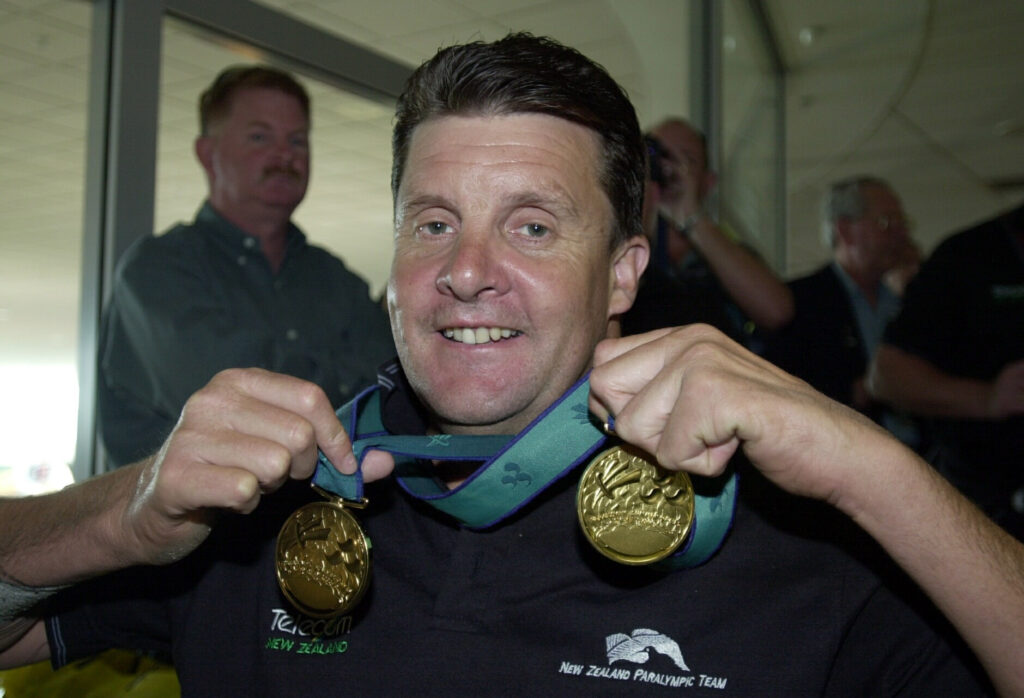
“One of my other big memories of Sydney was that of the six gold medals that New Zealand won, four of them were in the Para athletics field events as Peter Martin (in the Men’s Shot Put F53) and John Dowall (Paralympian #93 in the Men’s Javelin F44) also struck gold. At the Olympic Games, the New Zealand national anthem never played inside Stadium Australia as the only gold we won was by Rob Waddell in rowing. Yet after I won gold, we heard the anthem for the first time there. That was a really special moment.”
Para athletics proved a huge source of success for the NZ Paralympic Team, contributing ten of the total medal haul of 18. Yet New Zealand also enjoyed success in the pool as the Para swimmers delivered a further four medals led by West Aucklander Dean Booth, who in front of 18,000 passionate fans inside the Sydney International Aquatic Centre, enjoyed his finest hour.
Dean, who had previously specialised as a sprint swimmer, opted with the support of his coach Dean Greenwood, to change his approach, less than a year out from Sydney 2000, to focus his efforts on the Men’s 400m S7.
The switch was made following the reclassification of a British swimmer Dave Roberts who had moved to the S7 category and who had “smoked” Dean’s world record for the Men’s 100m Freestyle S7.
Training nine times a week out of the Mt Eden Swimming Pool, Dean was well prepared leading into Sydney 2000 only to be thrown a curve ball at the 11th hour.
“A couple of people withdrew from the 400m so instead of having heats we went to a straight final,” recalls Dean, who was born with cerebral palsy. “We had trained for a heat and a final, so I rang my coach. He calmed me down by saying, ‘don’t worry you have done the work’. We went through the game plan, and he said, ‘you got this’.””
Striving to swim under five minutes—a world record at the time—he recalls the surge of motivation he felt just before heading poolside for the race.
“A carer is assigned to each swimmer, but when one carer asked who was going to win the race and he pointed to Roberts, it really pissed me off,” adds Dean. “I’m normally a shy, humble person but I then started a slow hand clap, not saying anything but just letting him (Roberts) know I was there.”
Executing what he describes as “six good turns” he felt in control of the race and heading for gold only on the final lap to suddenly see a splash in the lane Roberts was occupying.
“I thought, oh, my God, I have to go now. I was absolutely buggered but in the final five metres, where the flags are, you are always taught not to breathe because it slows you down. I didn’t breathe, touched the wall and when I looked up at the big screen and it said NZL first, I knew I’d won. It was only by a margin of 11 hundredths of a second – a fingernail.” Dean had claimed a narrow victory from Roberts in a world record time of 4:53.75.
Dean later won bronze in the Men’s Freestyle 100m S7 and finished fourth in the Men’s 50m Freestyle S7, but gold in the 400m proved he and his coach had been vindicated in their decision to focus on the latter event.
“I’m still very proud of being a Paralympic champion,” adds Dean, 47, a dad-of-two who is today based in the West Auckland suburb of Te Atatu. “I played a lot of sports when I was younger without much success, people said, ‘why is this kid running’ but it proved to all those bullies that I could do sport to a high level.”
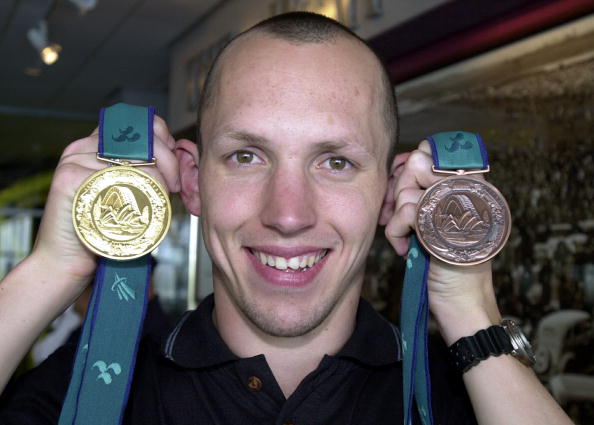
Jayne Craike was also to earn her slice of history in Sydney 2000 as New Zealand’s first and, so far, only Para equestrian gold medallist. Born in Wales, Jayne was a member of the junior British show jumping squad only for an accident aged 17 to change the trajectory of her career.
Later relocating to New Zealand she became a founding member of Para Equestrian and placing fifth on her Paralympic debut in Atlanta 1996, she went on to claim a silver medal at the 1999 World Championships to suggest she could climb the podium in Sydney 2000.
However, the rules for Para equestrian at the Paralympic Games meant the horse was assigned to rider by a random draw and horse and rider would only get four days to familiarise themselves with one another.
Thankfully, in Sydney, Jayne was given a very competitive horse although normally ridden by a male rider, this presented its own challenges. “It was very strong and I needed a couple of days to adjust my riding in such a way that instead of resisting the movement, I was going to go with it. He was a great horse with lots of talent.”
In front of a huge crowd in the Mixed Championships IV Grade event, Jayne experienced a level of hyper-focus she has rarely tasted throughout her long and successful career.
“I didn’t hear any outside distraction, it was like all noise had gone,” she recalls. “It was like everything was in slow motion it felt like I had all the time in the world, which was a bizarre feeling, that I’ve only ever had a couple of times since.”
Initially awarded silver, she was delighted with the achievement and stood proudly on the podium. However, later that night there was a twist when she was called and told the score sheets had been incorrectly added, and she had in fact won gold. She chuckles at the memory today but rather than being elated at the news she was instead initially disappointed.
“I was gutted to be honest because I would not get to enjoy the medal ceremony at that moment,” adds Jayne, now aged 63 and living in Taupō. “But reflecting on it now, it was amazing to think the journey I’d undertaken. All my dreams appeared shattered after that accident aged 17. Yet after moving into Para equestrian everything I had worked towards for that four-and-a-half minutes or so went so right.”
Jayne completed her quest at Sydney 2000 with a silver medal in the Mixed Freestyle Grade IV competition to complete an unforgettable Games.
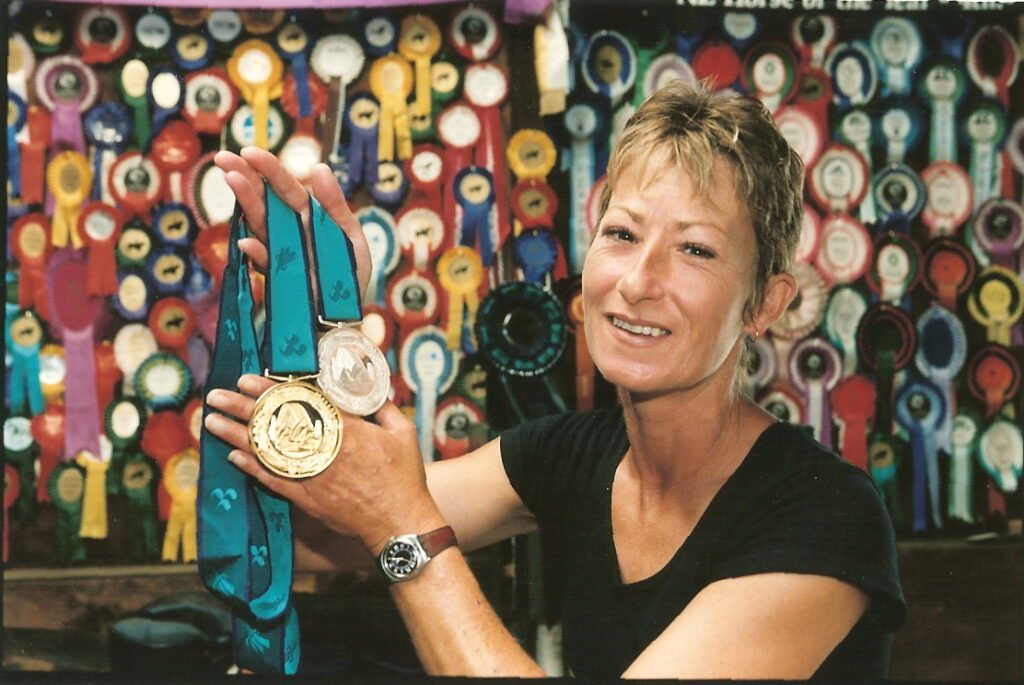
Team captain Ben Lucas was disappointed he could not fulfil his personal goals in Sydney 2000. Struggling with fatigue for much of that year impacted on his ability to train fully and he had to settle for a semifinal spot in the Men’s 5000m T54, tenth in the Men’s 10,000m T54 and 13th spot in the Men’s Marathon T54 – although he does recall one huge thrill in the latter race.
“I remember I was placed second going across the Sydney Harbour Bridge reaching a speed of 80kmph heading down an on-ramp on to the motorway, although when I crossed the line, it was mixed emotions because that was my last race before retiring.”
Ben would later serve at Chef de Mission at the Rio 2016 Paralympics, regarded as the most successful Paralympic Games of the modern era, as the NZ Paralympic Team claimed 21 medals to finish top of the medals per capita table.
However, he knows how significant Sydney 2000 had proved as the NZ Paralympic Team captured medals in five Para sports – including bronze for the Wheel Blacks.
“It was a special Team in Sydney and 19 of the 42 athletes selected were from my squads I worked with at that time for Parafed Canterbury,” adds Ben, 59, who today works as the Lead Disability Advisor for the ACC. “I was super proud of that and how well they’d performed in a high performance arena.”
Jayne agreed with Ben’s assessment and added: “You could feel the energy within the Team. The support was fabulous and everyone had each other’s back. I didn’t hear a bad word from anybody. It was quite amazing to have that unity.”
But the final word belongs to Currie, who would later serve as Chef de Mission at Olympic and Commonwealth Games.
“I was extraordinarily proud,” he says. “It was a real privilege to be in that position, and it is one I don’t take for granted. The Para athletes do all the work for many years and deserve all the credit, but I’m very grateful to have played a small part in their success.”

